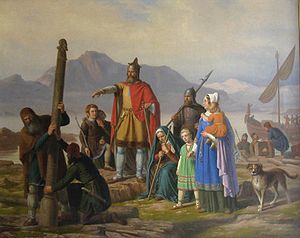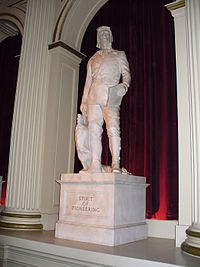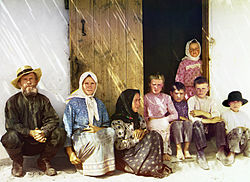- Settler
-
"Pioneers" redirects here. For other uses, see Pioneer (disambiguation).
A settler is a person who has migrated to an area and established permanent residence there, often to colonize the area. Settlers are generally people who take up residence on land and cultivate it, as opposed to nomads. Settlers are sometimes termed "colonists" or "colonials" and—in the United States -- "pioneers".
Contents
Terminology
The term settler is not usually used in relation to the later histories of well-established and/or independent, post-colonial countries with continuing immigration, like the present-day United States, Canada or Australia, where terms like immigrants are preferred. However, Canadian First Nations people often refer to all non-natives as "settler peoples", or "settler populations".[citation needed]
Historical usage
A personification of pioneering as represented by a statue in The American Adventure in the World Showcase pavilion of Walt Disney World's Epcot
In almost every real historical case, settlers live on land which previously belonged to long-established peoples, known as indigenous people (often called "natives", "Aborigines" or, in the Americas, "Indians"). This land is usually settled against the wishes of the indigenes, and then controlled, defended and expanded by force, or it is bought or leased from indigenous people on terms highly favourable to the settlers, sometimes under a treaty (e.g. the Treaty of Waitangi in New Zealand). In some cases (such as Australia), the legal ownership of some lands is contested much later by indigenous people, who seek or claim traditional usage, land rights, native title and related forms of ownership or partial control.
The word "settler" was not originally usually used in relation to unfree labour immigrants, such as slaves (e.g. in the United States), indentured labourers (such as in Colonial America),[1] or convicts (such as in New York, 1674–1775; Australia 1788-1868).
In the figurative usage a "person who goes first or does something first", also applies to the American English use of "pioneer" to refer to a settler, a person who has migrated to a less occupied area and established permanent residence there, often to colonize the area, first recorded in English in 1605.[2] In United States history it refers to those people who helped to settle new lands.
In this usage, pioneers are usually among the first to an area, whereas settlers can arrive after first settlement and join others in the process of human settlement.[citation needed] This correlates with the work of military pioneers who were tasked with construction of camps before the rest of the troops would arrive at the designated camp site.
More recently descendants of these immigrants may argue that they have as much right to use the word "settler" as the descendants of free immigrants.
In Imperial Russia, the government invited Russians or foreign nationals to settle in sparsely populated lands.[3] These settlers were called "colonists". See, e.g., articles Slavo-Serbia, Volga German, Volhynia, Russians in Kazakhstan.
Although they are often thought of as traveling by sea — the dominant form of travel in the early modern era — significant waves of settlement could also use long overland routes, such as the Great Trek by the Boer-Afrikaners in South Africa, or the Oregon Trail in the United States.
Anthropological usage
Anthropologists record tribal displacement of native settlers who drive another tribe from the lands it held, such as the settlement of lands in the area now called Carmel-by-the-Sea, California where Ohlone peoples settled in areas previously inhabited by the Esselen tribe (Bainbridge, 1977).[4]
Modern usage
In the Middle East, Israelis who live in areas captured during the Six-Day War, which were later claimed by the Palestinian Authority and Syria, are termed "settlers". Some historians and scientists maintain that Palestinians are descended mostly from Arab settlers in Palestine, after the Caliphate conquered the area in the 7th century. However, both Israelis and Palestinians claim partial descent from peoples who lived in the region in prehistoric times.
Other usages
- Settlers in hypothetical societies, such as on other planets, often feature in science fiction or fantasy fiction and/or video games.
- Mascot for Texas Woman's University, more specifically there called the "Pioneer."
Causes of emigration
The reasons for the emigration of settlers vary, but often they include the following factors and incentives: the desire to start a new and better life in a foreign land, personal financial hardship, social, cultural, ethnic, or religious persecution (e.g. the Pilgrims, Mormons and Zionists), political oppression, and government incentive policies aimed at encouraging foreign settlement.
The colony concerned is sometimes controlled by the government of a settler's home country, and emigration is sometimes approved by an imperial government.
See also
- Category:Settlers
- Squatter
- Indigenous people
- Settler colonialism
- Virgin Lands Campaign
- Phoenix Islands Settlement Scheme
- Transmigration program
- Israeli settlement
- Naturalized TRNC citizens
- Sooners
- Lebensraum
- Green March
References
- ^ Indentured Servitude in Colonial America
- ^ [1] Online Etymological Dictionary
- ^ Robert Greenall, Russians left behind in Central Asia, BBC News, 23 November 2005.
- ^ Prehistoric Sources Technical Study, prepared for the city of Monterey by Bainbridge Behrens Moore Inc., May 23, 1977
Categories:- Settlers
- Human migration
- Anthropological categories of peoples
- Cultural anthropology
- Settlers in hypothetical societies, such as on other planets, often feature in science fiction or fantasy fiction and/or video games.
Wikimedia Foundation. 2010.




